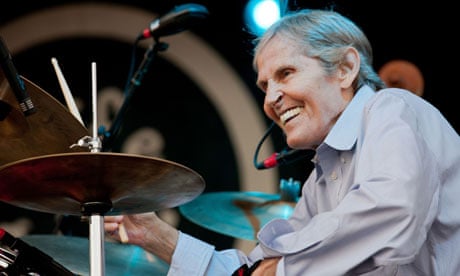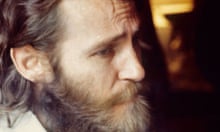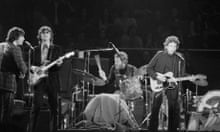A shorthand way of describing Levon Helm, who has died of cancer aged 71, would be as the drummer with the Band, who were Bob Dylan's backing group as he made the leap from folk to rock, and then forged a hugely influential career of their own in the late 1960s and 70s. This would have made Helm eminent enough, but his career stretched in many other directions, as drummer with the rock'n'roller Ronnie Hawkins, solo artist, prolific film actor and, most recently, host of the all-star Midnight Ramble Sessions. He was an accomplished multi-instrumentalist, and a fine and distinctive singer.
He was born Mark Lavon Helm in Elaine, Arkansas, the second of Nell and Diamond Helm's four children. His father was a cotton farmer but also a music lover, and the Grand Ole Opry and King Biscuit Time radio shows (the latter featuring the bluesman Sonny Boy Willamson) were favourites in the Helm household. His father bought him a guitar when he was nine, and he struck up his first musical partnership with his bass-playing sister Linda. The duo regularly won talent contests in local clubs.
Levon, as he would become known, formed his own high school rock'n'roll band, the Jungle Bush Beaters, and at 17 he was invited to perform onstage with Conway Twitty and his Rock Housers band. By now Levon had taken up the drums, having been inspired by Jerry Lee Lewis's sticksman Jimmy Van Eaton, and it was for his percussion skills that he was hired by Hawkins in 1957, to play with his band, the Hawks.
Though an Arkansas native like Helm, Hawkins found steady success in Canada, and in the early 60s Helm and Hawkins recruited a new batch of Canadian musicians who would later become the Band – the guitarist Robbie Robertson, the bass player Rick Danko, the pianist Richard Manuel and the organist Garth Hudson. In his autobiography, This Wheel's on Fire: Levon Helm and the Story of the Band (1993), Helm wrote that his new bandmates could not pronounce "Lavon" and called him Levon instead.
Tiring of Hawkins's dictatorial leadership, the group broke away in 1963 to become Levon and the Hawks. They recorded a couple of singles and made a living playing regular gigs in Canada and the US, but their career suddenly surged into overdrive when they were hired by Dylan as his backing band (by now called simply the Hawks) in 1965. But Dylan's move into amplified rock proved controversial, and Helm was so disturbed by the negative crowd reactions at some concerts that he quit and returned to Arkansas.
Dylan himself now retreated from the spotlight, and when he moved to the seclusion of upstate New York with the other Hawks, Helm rejoined them. During 1967, the group recorded the fabled Basement Tapes with Dylan, before commencing work on their own first album. The musicians shared a pink-painted house in West Saugerties, New York, dubbed Big Pink, whence came the title of their 1968 debut, Music from Big Pink. They called themselves the Band since they were known casually as "the band" to friends and neighbours.
The album was a restrained and mysterious mix of soul, country, rock, blues and gospel, distinguished by impeccable instrumental work and the harmony blend of Helm, Danko and Manuel. Helped by the single The Weight, it became a quiet sensation. Eric Clapton said of Big Pink that "it changed my life", and many other acts, from Fairport Convention to Elton John and even Led Zeppelin, felt its influence.
In 1969 they released The Band, often regarded as their pièce de résistance, for its masterly musicianship and songwriting, which seemed to reach back into the myths of American folklore and civil war history. The group's rustic, groaning harmonies lent huge emotional resonance to such pieces as The Night They Drove Old Dixie Down, Rockin' Chair and King Harvest (Has Surely Come). Subsequent releases never recaptured the same magic, though Rock of Ages (1972) was an excellent live set and Northern Lights – Southern Cross (1975) was a belated return to something like peak form. In 1974 they recorded Planet Waves with Dylan before backing him on a wildly acclaimed American tour.
In 1976, the Band staged a grandiose farewell concert in San Francisco, the Last Waltz, to mark what many felt was a premature end to their performing career. Internal politics, not least friction between Helm and the increasingly dominant Robertson, had hastened the group's demise. The concert featured a superstar guest list including Dylan, Clapton, Van Morrison, Joni Mitchell, Neil Young and many more, and was memorialised as a triple LP and a film directed by Martin Scorsese.
Helm wasted little time in launching a solo career, releasing Levon Helm and the RCO All Stars in 1977, which was followed by Levon Helm (1978) and American Son (1980). He made his film debut, playing the father of the country music star Loretta Lynn, in Coal Miner's Daughter (1980), which was followed by appearances in The Right Stuff (1983), The Dollmaker (1984), Feeling Minnesota (1996), The Three Burials of Melquiades Estrada (2005) and Shooter (2007).
In 1983 he reunited with Danko for an acoustic tour, and the following year Hudson and Manuel came on board for an acclaimed Band reunion, with only Robertson missing. After Manuel's suicide in 1986, Richard Bell, who had played with Hawkins, joined on piano, and the rebuilt Band released three albums, Jericho (1993), High on the Hog (1996) and Jubilation (1998).
In 1998 Helm was diagnosed with throat cancer. Although he lost his singing voice, he continued to perform (playing the drums, mandolin and harmonica) with his daughter Amy. The following year, Danko died. The defiant Helm fought back to performing fitness, and in 2004 he inaugurated his Midnight Ramble Sessions, live performances at his own Levon Helm Studios in Woodstock, New York. These get-togethers – attended by Emmylou Harris, Steve Earle, John Sebastian, Donald Fagen, Billy Bob Thornton and many others – have been preserved on several live recordings.
In 2007 Helm released Dirt Farmer, a haunting set of old-time folk and country songs that won him a Grammy award for best traditional folk album. In 2008, he was awarded a Recording Academy lifetime achievement award as an original member of the Band, as well as an artist of the year award from the Americana Music Association. Electric Dirt (2009) brought another Grammy, for best Americana album, and Ramble at the Ryman (2011), recorded at Nashville's Ryman Auditorium, earned a third.
Helm is survived by his wife Sandy and daughter.
Levon Helm (Mark Lavon Helm), musician, born 26 May 1940; died 19 April 2012



